We remember when AC was a luxury. (We’ve been in business quite awhile.) Today, a cool and comfortable home is essential in the summer heat. Whether your unit is not functioning, blowing warm air, making strange noises, or just not performing as it used to, you need expert technicians who can diagnose and fix the problem quickly. Regular maintenance can prevent many issues, but prompt and reliable repair is crucial when unexpected breakdowns occur. If you need HVAC repairs, don’t hesitate to call. If you’d like to read more about air conditioner repairs, we urge you to continue.
- Air Conditioner Repairs
- How Hot Days Affect Your Air Conditioner
- Tips to Reduce Strain on Your Air Conditioner in Summer
- What Breaks First: Common Summer AC Repairs and Warning Signs to Watch For
- When It Sounds Like It’s Working, But Isn’t: Common AC Misdiagnoses
- Homeowners’ Most Common AC Repair Questions
HOW HOT DAYS AFFECT YOUR AIR CONDITIONING
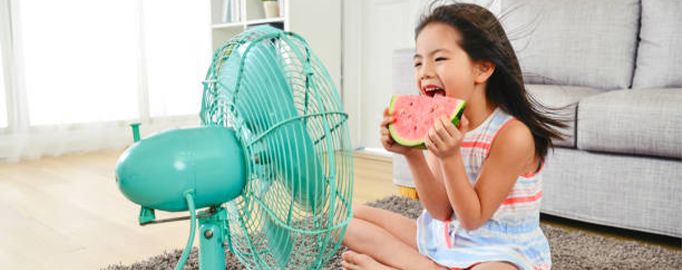
Hot days significantly impact air conditioning systems, leading to increased energy consumption, potential system strain, and a greater likelihood of malfunctions. Understanding these effects can help homeowners and businesses optimize their air conditioning use and maintenance to ensure efficiency and longevity.
Increased Energy Consumption
Air conditioners must work harder on extremely hot days to maintain the desired indoor temperature. This increased workload leads to higher energy consumption, which can significantly raise electricity bills. When outdoor temperatures soar, the heat load inside a building increases, meaning the air conditioner has to remove more heat to achieve the same cooling effect. This extended operation consumes more energy and puts more strain on the system components, potentially leading to faster wear and tear.
System Strain and Efficiency Loss
Air conditioning units are designed to operate optimally within certain temperature ranges. The system’s efficiency decreases when outdoor temperatures exceed these ranges, typically above 95°F (35°C). The air conditioner struggles to expel heat into an already hot environment, reducing its cooling capacity. This inefficiency can cause the system to run continuously without achieving the desired indoor temperature, leading to overheating and potential system failures.
Impact of Humidity
Humidity is another critical factor that affects air conditioning performance. On hot, humid days, air conditioners not only have to cool the air but also remove excess moisture. High humidity levels can make the indoor environment feel warmer than it is, prompting the air conditioner to work harder. This dual burden of cooling and dehumidification can significantly reduce the system’s efficiency and increase energy usage.
Maintenance and Preventive Measures
Proper maintenance is crucial to ensure that air conditioning systems can handle the stress of hot weather. Regularly cleaning or replacing air filters, ensuring condenser coils are free of dirt and debris, and checking for adequate refrigerant levels can help maintain system efficiency. It is also essential to ensure good airflow around the outdoor unit by keeping it free from obstructions like shrubbery or debris. Poor airflow can cause the unit to overheat and fail prematurely.
Choosing the Right Equipment
Selecting an appropriately sized air conditioner is also vital. An oversized unit may cool the air quickly but will not run long enough to dehumidify effectively, leading to a damp indoor environment. Conversely, an undersized unit will struggle to cool the space adequately, running continuously and wearing out faster. Consulting with HVAC professionals to make sure you have the correct size and capacity for your needs can ensure better performance and longevity.
TIPS TO REDUCE STRAIN ON YOUR AC IN SUMMER
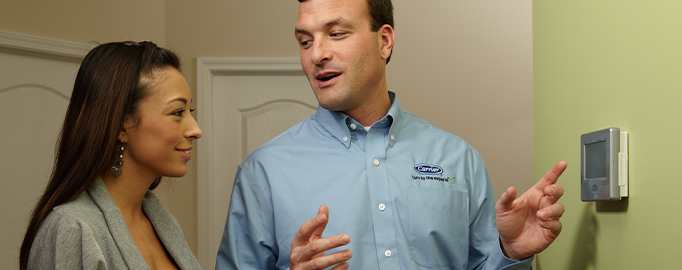
Keeping your home cool can be challenging when the scorching summer heat arrives. Running your air conditioner efficiently during these blistering days is crucial to maintaining comfort while keeping energy bills in check. Here are some practical tips to help you get the most out of your AC system when the temperatures soar.
Optimize Thermostat Settings
Setting your thermostat to the right temperature can make a big difference in both comfort and energy consumption. Aim for a setting that balances coolness with efficiency. The U.S. Department of Energy recommends setting your thermostat to 78°F (26°C) when you’re home and higher when you’re away. This setting keeps you comfortable while reducing the strain on your air conditioner.
Use a Programmable Thermostat
A programmable thermostat can help you manage your cooling needs more effectively. Set it to increase the temperature when you’re not home and lower it before you return. Some smart thermostats can even learn your schedule and adjust settings automatically. Using a programmable thermostat ensures comfort when needed and saves energy by avoiding unnecessary cooling.
Keep Blinds and Curtains Closed
Sunlight streaming through windows can significantly increase indoor temperatures. On hot days, keep blinds and curtains closed, especially on windows that receive direct sunlight. Window coverings can block out heat and reduce the workload on your air conditioner. Consider using blackout curtains for even better insulation against the heat.
Use Ceiling Fans
Ceiling fans can complement your air conditioning by circulating cool air throughout the room. While fans don’t lower the temperature, they create a wind-chill effect that makes you feel cooler. Running a fan allows you to set your thermostat a few degrees higher without sacrificing comfort. Just remember to turn off fans when you leave the room, as they cool people, not spaces.
Seal Leaks and Insulate
Ensure that your home is well-insulated and that there are no air leaks around windows, doors, and ductwork. Proper insulation keeps cool air inside and prevents warm air from entering. Sealing leaks with weatherstripping or caulk can make a significant difference in maintaining indoor temperatures and reducing energy usage.
Limit Heat-Producing Activities
Avoid using heat-generating appliances like ovens, stoves, and dryers during the hottest parts of the day. These appliances can add unnecessary heat to your home, making your air conditioner work harder. Instead, opt for grilling outside, microwaving, or using small countertop appliances that produce less heat.
Maintain Your Air Conditioner
Regular maintenance is vital to keeping your AC running efficiently. Change or clean the air filter every month or as the manufacturer recommends. A dirty filter restricts airflow and reduces efficiency. Schedule annual maintenance with a professional to check for issues like refrigerant levels, coil cleaning, and overall system performance.
Keep Vents and Registers Clear
Ensure that furniture, curtains, or other obstructions do not block vents and registers. Blocked vents can restrict airflow and reduce your air conditioner’s effectiveness; clear paths for air to flow freely throughout your home to ensure even cooling.
Use Exhaust Fans
Use exhaust fans in bathrooms and kitchens to remove heat and humidity from showers and cooking. Running these fans helps to expel hot air and reduce the load on your air conditioning system.
Create a Cooling Zone
If you spend most of your time in one area of your home, consider creating a cooling zone. Close the doors to unused rooms and direct airflow to the areas you need most. This can help your air conditioner cool your living space more efficiently.
What Breaks First: Common Summer AC Repairs and Warning Signs to Watch For
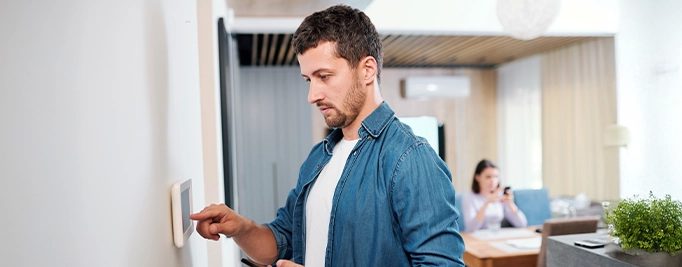
When Indiana’s mid-summer heat hits full stride, your air conditioner works harder than almost any other time of year. From component failures to airflow problems, there are certain types of breakdowns we see over and over during high-temperature stretches.
Extreme summer temperatures can expose underlying weaknesses or accelerate wear and tear that might otherwise go unnoticed during milder weather. Below are the five most common AC repair issues during Indiana’s peak summer temperatures, and warning signs to watch for to catch them early.
1. Capacitor Failures
Capacitors are small but essential components that help start and run the AC system’s compressor and fan motors. They’re under constant electrical load during stretches of hot weather, increasing the risk of swelling, leaking, or short-circuiting. Once a capacitor fails, the system can no longer start properly or maintain a full cooling cycle.
Early Warning Signs:
- If your AC hesitates when starting or stutters before kicking on, the capacitor may be weakening.
- You might hear a repeated clicking sound as the unit attempts to start.
- Even when the system is running, air blowing from vents may feel lukewarm.
2. Low or Leaking Refrigerant
Refrigerant is the fluid that cycles through your AC system to absorb heat from inside and release it outside. Extreme temperatures can stress joints or connectors and lead to refrigerant leaks. A low refrigerant level reduces cooling performance and can cause the system to freeze or overheat.
Early Warning Signs:
- You may notice ice forming on the refrigerant line or the outdoor unit, even on a hot day.
- A faint hissing sound coming from the AC unit could indicate a refrigerant leak.
- If the airflow from your vents seems weak and indoor temperatures climb despite the system running, a refrigerant issue may be the cause.
3. Dirty or Blocked Condenser Coils
Outdoor condenser coils are responsible for releasing the heat absorbed from your home. When they become covered in dirt, grass clippings, or summer pollen, they can’t work effectively and raise the risk of your system overheating.
Early Warning Signs:
- Your AC runs longer than usual during each cycle.
- The outdoor unit feels excessively hot to the touch, signaling poor heat dissipation.
- Your home remains warm even though the system seems to be running fine.
4. Overworked Fan Motors
The indoor blower and outdoor fan motors are essential for maintaining airflow and cooling performance. These motors operate almost non-stop during extended mid-summer heat, increasing friction and heat buildup, and they can wear out or fail altogether.
Early Warning Signs:
- Rattling or grinding noises suggest the fan motor is under strain or has a worn bearing.
- The fan may run slowly or stop unexpectedly while the system is still on.
- The system shutting down mid-cycle could mean the motor is overheating.
5. Thermostat Malfunctions
Extreme outdoor heat can throw off thermostat sensor readings, especially in direct sunlight or near supply vents, causing erratic cooling performance.
Early Warning Signs:
- Faulty temperature readings can cause the system to cycle on and off frequently.
- The AC may run when your home already feels cool, or not at all when it’s too warm.
When It Sounds Like It’s Working, But Isn’t: Common AC Misdiagnoses
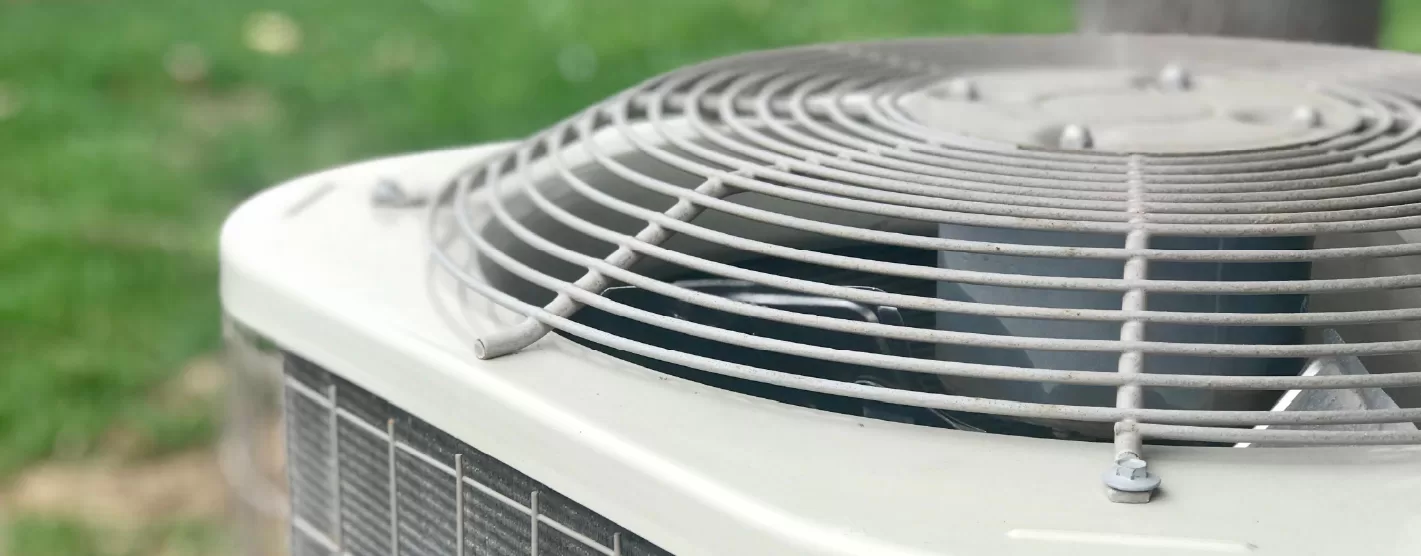
Air conditioning systems are complex, and homeowners can often easily misread what’s really happening when comfort slips. You might hear your system humming or see fans spinning, but those signs alone don’t guarantee effective cooling.
During Indiana’s hottest months, cooling issues can initially seem minor, causing confusion and misdiagnoses. Misreading these early symptoms often delays necessary AC repairs, allowing small issues to worsen quickly.
The Fan Runs—But Cooling Stops
Homeowners sometimes feel airflow and assume the AC system works fine. But if the air from your vents isn’t cold, your system isn’t properly removing heat. Problems like iced-over evaporator coils, low refrigerant, or a blower fan pushing warm air can all result in ineffective cooling. Instead of ignoring lukewarm air, check carefully for temperature differences to identify this issue quickly.
The Thermostat Appears Correct—But the System Doesn’t Cool
Programmable thermostats can sometimes mislead homeowners. You might set the thermostat accurately, hear the system activate, yet notice your home remains warm and incorrectly blame the thermostat. However, underlying problems might include malfunctioning sensors, issues in the control board, or blower motors failing to start.
The AC Runs Constantly—So It Must Be Working, Right?
When your AC runs constantly, it can seem like it’s just working extra hard. Continuous running, however, sometimes signals trouble. An AC system operating non-stop without adequately cooling your home may have dirty coils, low refrigerant, or poor airflow. Homeowners frequently overlook these problems, assuming their system just needs extra time. Proactively checking filters, coils, and airflow can reveal issues before they worsen.
Uneven Cooling Might Indicate Hidden Issues
If some rooms cool comfortably while others stay warm, homeowners typically blame insulation or sun exposure. Although these factors matter, uneven cooling more often results from airflow restrictions or a malfunctioning blower motor. Don’t assume the problem lies in external factors alone. Carefully evaluate room-to-room differences, checking vents for weak airflow and odd noises indicating blockages or mechanical faults.
Ignoring Early Signs Can Lead to Costly Repairs
Small symptoms like inconsistent cooling, slightly warmer air, or unusual sounds may seem insignificant initially. But overlooking these minor indicators can lead to major system failures during peak summer heat. Acting promptly at the first sign of trouble prevents bigger problems and expensive repair bills down the line.
Don’t be fooled by what may seem normal. If your AC seems to run but fails to cool your home as effectively as in previous summers, it’s time for a deeper look.
Homeowners’ Most Common Questions About Air Conditioner Repairs
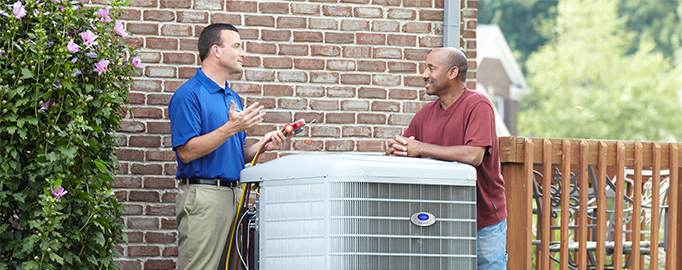
You have questions, and we have answers. We understand that when your AC is not performing as expected, you may want to try to figure it out before calling for air conditioning repairs. Here are some common questions we get about AC repairs.
How can I tell if my air conditioner is broken?
- Check if the thermostat is working and has power.
- Ensure the air filter is clean, and the condenser is not blocked.
- Verify that the circuit breakers are on.
- If these steps don’t resolve the issue, consult a professional for further diagnosis.
How do I change my air filter?
- Remove the old filter and record its size, or refer to the manufacturer’s user manual for the correct size.
- Choose a filter with an appropriate MERV rating for your needs.
- Install the new filter following the manufacturer’s instructions.
When should I replace my air conditioner?
If your AC unit is over 10-15 years old, it might be time for a replacement.
Rising energy bills, frequent repairs, or leaking refrigerant are signs that a new unit might be needed.
Why is my AC leaking water?
Common causes include a blocked or broken condensation drain, a dirty air filter, or low refrigerant levels. These issues can cause the evaporator coil to freeze and defrost, leading to water leaks.
What are the most common AC repairs?
Common issues include refrigerant leaks, drainage problems, and frozen condenser coils. Regular maintenance can help prevent these problems.
How much does it cost to repair or replace an AC unit?
Minor repairs can cost between $50 and $200, while more complex repairs can range from $200 to $2,000. Replacing an AC unit can cost between $2,500 and $7,500, depending on the type and size of the unit.
Can I install or work on my air conditioner, or should I hire a professional?
Working with any electrical equipment can be dangerous, and seeking a professional’s help is always recommended. Otherwise, you risk injury and may end up spending more money than you would have if you had called in the experts. While you can install window or portable AC units yourself, we recommend you hire a professional for split systems or central AC units to ensure proper installation and safety.
How long should an AC unit last?
With regular maintenance, an AC unit can last between 10 and 20 years. Factors such as the quality of the installation, the unit’s model, and the frequency of use can affect its lifespan.
